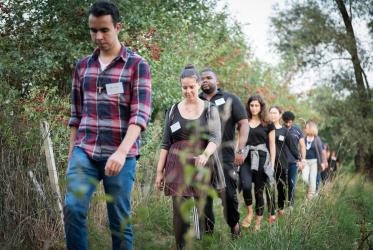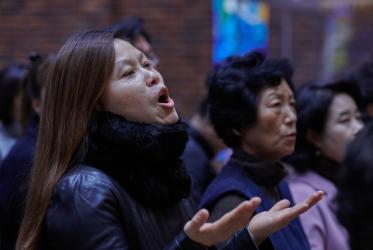* By Hisashi Yukimoto
Twenty-seven indigenous and ecumenical youths gathered together for a five-day World Council of Churches (WCC) event this week in Japan’s third-largest, western city of Osaka. Participants gathered under the theme, “WCC Continuing Formation on Youth and Racism Awareness in Asia & Indigenous Youth Pilgrimage of Justice and Peace.”
“We commit to and call the youth of the world to: articulate and write our identities and traditions that continue to be suppressed by the majority or ignored by the government; engage and empower people towards an inclusive church; unite individuals that respect uniqueness, church response and contribution to indigenous people and solidarity with non-indigenous people; and open a space for dialogue: willing to listen,” they said in their Call to Action at the end of the event.
Promoting youth engagement
The event was held as part of the WCC’s advocacy for promoting youth engagement in the ecumenical movement in collaboration with the Office of the National Christian Council in Japan.
“The continuing formation on youth and racism Awareness in Asia, and the indigenous youth Pilgrimage of Justice and Peace, is a time of education and solidarity work on the issues, situations, and contexts related to racism in Asia,” said Joy Eva Bohol, WCC Youth programme executive.
The orientation on racism in Japanese context was made by a guest speaker, Yuriko Moto, who is a retired professor of international human rights law at Osaka Jogakuin University and currently a visiting researcher at the Center for Asia-Pacific Partnership at Osaka University of Economics and Law. She delivered a lecture entitled, “Racial discrimination in Japan”.
Moto explained that marginalized minority groups faced with racial discrimination in Japan include indigenous peoples of Ainu in the country’s northernmost island prefecture of Hokkaido and Okinawans in the southwestern island prefecture of Okinawa, formerly independent Kingdom of Ryukyu, who “experienced invasion or threat, annexation, deprivation, discrimination, and forceful assimilation.”
They also include “Buraku” people who have been discriminated against on the ground of descent, immigrants and their descendants, including Koreans and Taiwanese from former colonies of Japan, along with “newcomers and settlers” from other parts of the world and migrant workers and their family members, according to Moto.
She noted that Osaka is “a home of very many Koreans and Buraku people.” She added that a small group of Vietnamese refugees who fled from the Vietnam war are living there.
Racism against the people
Rev. Mari Valjakka, a young indigenous Sami pastor of the Evangelical Lutheran Church of Finland, shared experiences of racism against her people in Lapland in northern Europe through their history of assimilations by the governments of Finland, Norway, Sweden, and Russia.
“Many Sami people carry on their shoulders traumas that have been passed down from one generation to the next,” she said, “many young sami people face everyday racism via social media and some of them have also experienced racism during their studies in University.”
Valjakka, who is also the moderator of the WCC reference group on indigenous peoples, explained the WCC’s indigenous people’s program in overview, and led a session to “build bridges” between indigenous and non-indigenous youth.
Rev. Cruz Karati-Fox, an indigenous Maori priest of the Anglican Church in Aotearoa, New Zealand and Polynesia, made his presentation with its theme, “Nga Awa e Rua The two Flowing Rivers: An Experience of Cultural-Ethnic Difference and Injustice in Aotearoa New Zealand”.
Fabian Alberto Corrales Gutierrez, youth coordinator for the Ecumenical Disability Advocates Network in Costa Rica, is hearing disabled, made his presentation on the experience of people with disability, and emphasized the importance of engagement and empowerment in “living the inclusive experience”.
During the participants’ visits on Tuesday to Taisho-Ward in the southwestern part of the City of Osaka where many Okinawan migrants have lived, Munekatsu Kaneshiro, a 62-year-old second-generation Okinawan in the ward, shared their history along with his own story of identity formation and living there with some other minorities as a high school teacher.
At Nozaki Center for Culture of Human Rights in Osaka’s eastern City of Daito, Miki Tanimoto, one of the two secretaries of the Buraku Liberation Center of the United Church of Christ in Japan, told the participants about the center in the city and its activities to “change Buraku discrimination in the society and within the church and inform them of Buraku discrimination.”
* Hisashi Yukimoto has been a Japanese Christian journalist for more than 10 years.






